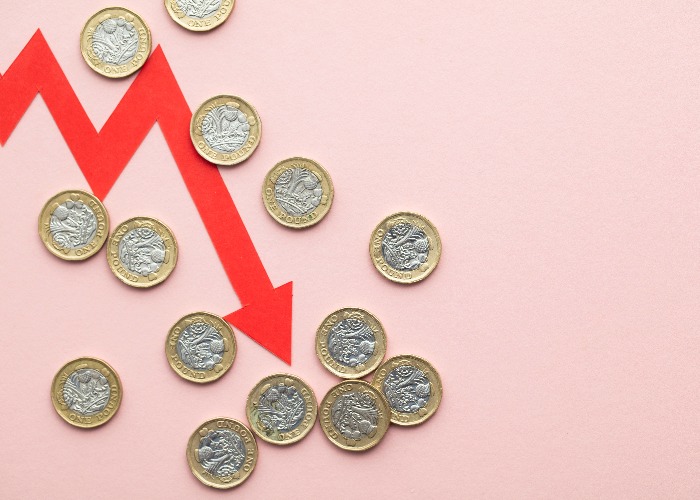What falling inflation means for your money

We explain what falling inflation means for your finances, and why you shouldn't expect price cuts any time soon.
Inflation has dropped to its lowest level in two years.
It’s excellent news for all of us, given the pressure that rising prices have put all of our finances under, with the consumer prices index measurement of inflation falling to 4.6% in October according to the Office for National Statistics.
It’s particularly good news for the Government, given halving inflation was one of the Prime Minister’s promises for the year, a pledge which has now been achieved.
However, as welcome as the drop from the 6.7% registered the month before is, it’s important to be realistic about the impact it will have on our finances.
Because this drop certainly doesn’t mean that the good times are here again.
Manage all your savings pots in one place and earn an inflation-busting 5.6% with Raisin
Why aren’t prices falling?
It’s really important to emphasise here that just because inflation is falling, that doesn’t mean things are getting cheaper.
Inflation only tracks the rate at which prices are growing, and so a drop in that rate merely means that price rises are taking place more slowly than was previously the case.
This is crucial to understand since, while it’s welcome that inflation is dropping, it doesn’t on its own mean that any of us are any better off, just slightly less worse off.
Data from the ONS itself makes this clear.
One of the big contributors to this latest fall was the change in food prices, which between September and October increased by just 0.1% compared with a 2% rise in the same month last year.
This is obviously a good thing, but we continue to pay the price for the previous enormous rate of food inflation, given that the price of food in October was found by the ONS to be a massive 30% higher than the same month in 2021.
Similarly, energy bills were pinpointed by the ONS as a notable factor in the fall in inflation, yet the cost of gas is up by 60% on two years ago, while electricity is up by 40%.
Unless your income is rising by an inflation-beating rate ‒ and good luck with that ‒ then you remain worse off, even with inflation dropping.
And let's be clear, there isn't much indication that things will get cheaper anytime soon.
A number of supermarket bosses have said they don't expect prices to come down in 2024, while analysts at Cornwall Insight believe energy bills will rise by 5% from January.
What does the inflation fall mean for savers?
The first group to consider here are savers.
Inflation has been the big driver in the regular increases we’ve seen to Base Rate over the couple of years, to its current level of 5.25%.
After all, hiking the rate is the main way for the Bank of England to attempt to get inflation under control, but if it is heading in the right direction then there is no impetus to keep increasing it.
Indeed, we’ve already seen that mentality in action, with the Bank opting to freeze Base Rate at its last two meetings, suggesting that it has now peaked.
That has real implications for savers, since the interest rates offered on leading savings accounts of all kinds have risen as Base Rate has.
If Base Rate has peaked, then chances are so too have savings deals, meaning it’s important to move quickly to secure the best rate you can before they are pulled.
In truth, if you haven’t already moved your money, you may have missed the boat.
Analysis from Moneyfacts has shown how the best buy deals on various accounts have dropped over the last month.
In October for example you could get 5.30% on your easy access savings, 5.60% on notice savings and 6.11% on a one-year fixed-rate bond.
Today the best rates on those deals are 5.20%, 5.56% and 5.91% respectively.
They are only likely to head in one direction too, so acting quickly is important.
What does the inflation fall mean for mortgage borrowers?
The increases to Base Rate over the last year or so have had an enormous impact on mortgage borrowers and with it the property market.
Interest rates on mortgages have risen sharply, and that has caused plenty of would-be homebuyers to put their purchase plans on hold.
That has led to big drops in property transaction levels ‒ the number of home sales in September was down by 19% on the same point last year, for example.
Unsurprisingly this has also hit the value of property.
That lack of demand from buyers means there isn’t quite the same bunfight when a property hits the market, meaning vendors have to be a bit more realistic in what they will be able to sell for.
The expectation that rate rises have peaked may change that, though.
We have already seen rates on mortgages start to drop in recent weeks, as swap rates ‒ essentially the cost of borrowing for mortgage lenders ‒ have started to fall.
That is only likely to continue as predictions grow stronger around when Base Rate will be reduced.
It puts borrowers in a tricky spot and is likely to push more towards shorter-term fixed rates.
After all, why sign up for a five-year fixed rate ‒ the product of choice for some time ‒ when you are confident that rates will be lower 12 months down the line?
Manage all your savings pots in one place and earn an inflation-busting 5.6% with Raisin
Comments
Be the first to comment
Do you want to comment on this article? You need to be signed in for this feature